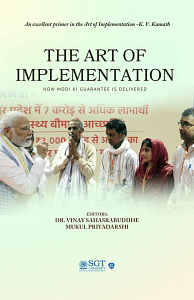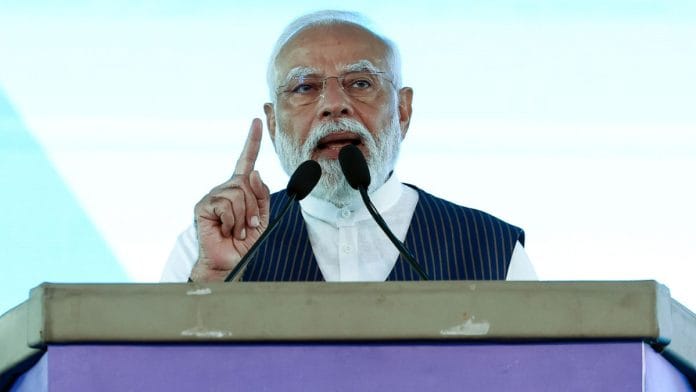Under the visionary leadership of Prime Minister Modi, the Governance landscape of India has radically changed in scale, scope and learning paradigms. India has succeeded in transforming technologically obsolete institutions into modern day digital institutions which benefit millions of Indians. Today India’s rural country side has changed – banking Correspondents, e-Mitras and common service centers have bridged the gap between internet poor and internet rich. As India celebrates its Amrit Kaal period, the Prime Minister has given a clarion call for adoption of Next Generation Reforms by bridging the gap between government and citizens. This vision of Next Generation administrative reforms of the Prime Minister has been diligently translated into reality by DARPG. Secretariat Reforms, Special Campaigns, Benchmarking of Governance and Services, Redressal of Public Grievances & Improving Service Delivery, recognizing meritocracy and replication of good governance practices form the core of India’s good governance model. It is with a great sense of pride, that I must narrate the technology adoption in the Central Secretariat
with ASO’s/ SO’s/ Under Secretaries undergoing reskilling in Emerging Technologies using i-GOT Mission Karmayogi. The Digital March of the Central Secretariat has had significant spill over effects to Attached/ Subordinate/ Autonomous bodies, all of whom adopted e-Governance practices. State Secretariats adopted e-Office and several services were operationalized as e-Services. Strong Digital Platforms formed the bulwark of the Digital Public Infrastructure push of India in the G20 deliberations as a global public good. Technology impact in governance was most visible in Jammu & Kashmir which provided an all-time high of 1080 e-services, adopted e-Office saving crores of rupees from abolition of the Darbar movement, developed the JK-IGRAMS, convened regional conferences and national conferences on e-Governance.
India’s governance model in the years 2019-2023, has undergone radical reforms. e- Governance has simplified a citizen’s interface with Government, brought government and citizens closer and enabled benchmarking of service quality. The Central government’s e-governance models have benefitted in bringing transparency and openness to government processes. The widespread adoption of e-Office ver 7.0 has created paperless offices in all 75 Ministries/Departments in the Central Secretariat 89 percent files being handled as e-files. In 2022, CPGRAMS helped redress 18 lac Public Grievances. The organizational reforms coupled with significant reforms in Personnel Administration like Mission Karmayogi, Lateral Recruitment, accelerated promotion policies, regional conferences for replication of good governance practices, recognizing excellence in public administration by scaling up the scheme for PM’s Awards for Excellence in Public Administration represent a paradigm shift in India’s governance models. New India’s strong institutions are best symbolized by adoption of e-governance practices. The best manifestation of “Maximum Governance – Minimum Government” policy is a “Digitally Empowered Citizen” and a “Digitally Transformed Institution.”
India observes 21 April every year as “Civil Services Day”, the day is marked as an occasion for civil servants to rededicate themselves to citizens and renew their commitment to public service and excellence in work. The theme of the 16th Civil Services Day on 21 April 2023 was “Viksit Bharat – Empowering Citizens and Reaching the Last Mile.” The Hon’ble Vice President of India inaugurated the Civil Services Day events on 20th April. The Conference deliberations were held during the 2 Plenary sessions – ‘Empowering Citizens -Leveraging Public Digital Platforms’, ‘Promoting Circular Economy for Sustainable Development’ and 4 Breakaway sessions ‘Piped Water for all–Jal Jeevan Mission’, ‘Holistic Health care for All – Health & Wellness Centres’, ‘Improving Quality of Education – Improving Outcomes through Vidya Samiksha Kendras’, ‘Aspirational Blocks Program – Reaching the Last Mile’ on April 20, 2023. The Conference was attended by more than 25000 delegates, with officials attending physically in Vigyan Bhawan and through the web-casting of the event in virtual mode. This was the highest ever participation in Civil Services Day events. The 16th Civil Services Day 2023 was a landmark event.
The Hon’ble Prime Minister conferred the Prime Minister’s Awards for Excellence in Public Administration 2022 instituted to recognize the efforts and exceptional work done by the civil servants to 15 Award Winners. The 2022 PM’s Awards were awarded for Innovations in Central Government, State Governments and District Level innovations. In the Priority Programs, District performances were evaluated for Har Ghar Jal Yojana, Health and Wellness Centres, Samagra Shiksha and Aspirational Districts Program.
Hon’ble Prime Minister personally reviewed the scheme and the restructuring of the Scheme was undertaken as per his directions to ensure maximum participation with the focus on empowering citizens and reaching the last mile with a saturation approach. In 2022, an all-time high number of nominations were received from States/UTs – 743 District Collectors submitted 2520 nominations for PM’s Awards 2022. This was 97% of the total districts of the country who participated in the PM’s Awards 2022 Scheme. Committees at various levels – Screening Committees chaired by Additional Secretaries, Expert Committee chaired by Secretary, DARPG screened the applications based on the parameters of the scheme, presentations by District Collectors and other Head of Departments, around 5.5 lakh citizen feedback calls and ‘on the spot’ study conducted by two members teams of the rank of Directors/Deputy Secretaries for all shortlisted initiatives. An empowered committee chaired by Cabinet Secretary made the final selections from 32 shortlisted nominations. Of these 15 nominations received the PM’s awards for Excellence in Public Administration 2022. The award-winning nominations were also presented in the exhibition
at Vigyan Bhavan.
 This excerpt from ‘The Art of Implementation’, edited by Vinay Sahasrabuddhe and Mukul Priyadarshi has been published with permission from SGT University.
This excerpt from ‘The Art of Implementation’, edited by Vinay Sahasrabuddhe and Mukul Priyadarshi has been published with permission from SGT University.






